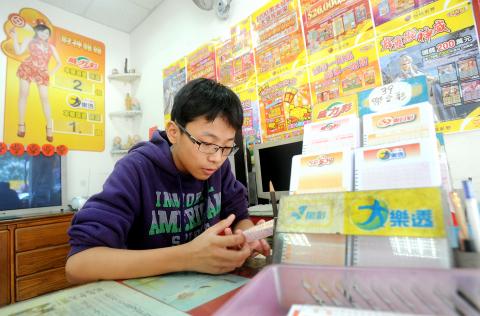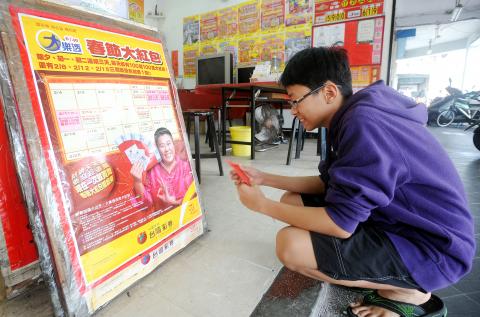Minors, or people under the age of 18, are not being kept from buying lottery tickets at lottery retailers. The Consumers’ Foundation has asked the Taiwan Lottery Co to help deal with the serious Taiwanese obsession of playing the lottery.
An investigation conducted by the Consumers’ Foundation found that lottery retailers are selling lottery tickets to minors, despite Public Welfare Lottery regulations prohibiting minors from purchasing lottery tickets or claiming prize money. During a recent covert survey, the foundation sent junior high and elementary school students to 80 different lottery retailers to buy lottery tickets, and not one of them was turned away. Roughly 98 percent of the retailers sold tickets to the minors without asking any questions pertaining to age, and only 80 percent of the retailers had signs at the entrance or inside their stores saying you must be at least 18 years old to purchase lottery tickets or claim prize money.
Lottery stand businesses always thrive during the Lunar New Year. The Consumers’ Foundation recently received a complaint from one parent who saw a child buying lottery tickets from a lottery retailer, which prompted the foundation to send out undercover junior high school and elementary school students to purchase lottery tickets. The results of the survey showed that only one retailer had qualms about selling lottery tickets to a minor, but, even so, he assumed that an adult customer standing behind the child was the child’s parent and still sold the tickets to the student without verifying his age.

Photo: LinCheng- kung, Liberty Times
照片:自由時報記者
According to the law, retailers selling lottery tickets to minors can be fined between NT$30,000 and NT$250,000, and the price of the ticket and amount won must be claimed as profits for the Public Welfare Lottery. Although the regulations are clear, retailers are still not complying with the law. The survey showed that the only two retailers who made age inquiries still sold the lottery tickets to the minors.
National Treasury Agency Deputy Director-General Chen Hsueh-hsiang says that the agency will continue enhancing its training and oversight programs. The Taiwan Lottery Co, on the other hand, says it places the utmost importance on the issue and will be working hard to improve the effectiveness of its training, ensuring that retailers do not sell lottery tickets or allow prizes to be claimed by minors, adding that if a retailer is not able to determine whether a person is at least 18 years old, they should ask for identification. The company says that it will also revoke retailers’ lottery licenses if they are caught selling lottery tickets to minors.
(Liberty Times, Translated by Kyle Jeffcoat)

Photo: Lin Cheng-kung, Liberty Times
照片:自由時報記者
未滿十八歲的孩子到彩券行買彩券,竟百分百不設防!消基會要求台彩公司正視「全民」瘋彩券的嚴重性。
消基會調查發現,儘管公益彩券發行條例規定,不得發售公益彩券或支付獎金給未滿十八歲者。但消基會派出國中小學生進行測試卻發現,隨機抽樣的八十家業者,全數都販賣彩券給未滿十八歲的測試者、九成八的彩券行未過問或確認購買者年齡;且只有八成的彩券行於出入口或店內標示「未滿十八歲不得購買或兌領彩券」。
每到農曆年,投注站總是生意興隆,消基會接獲家長投訴,看過彩券行賣彩券給小孩。消基會於是找了中小學生進行測試,結果僅一家業者有疑慮、但因誤以為站在後方準備買彩券的成人是家長,未再確認年齡便賣了彩券給測試學生。
依規定,業者販賣彩券給未滿十八歲者,可處新台幣三萬元以上、二十五萬元以下罰鍰,且應將售得的價金與所中獎金同額的款項,充作公益彩券盈餘。雖然法條規定得清清楚楚,但業者仍未依規定嚴格執行。調查也發現,即使有兩家業者詢問測試者的年齡,但問完後還是把彩券賣給測試者。
公益彩券主管機關財政部國庫署副署長陳雪香說,將要求台彩公司持續加強宣導和監控;台彩公司說,該公司極度重視消基會所提的問題,即日起配合加強宣導,確實執行不販售或兌領彩券給未滿十八歲消費者,若無法辨識對方是否年滿十八歲,須要求出示身分證明,未確實執行者,將取消其經銷商資格。
(自由時報記者楊久瑩、張舒婷、郭顏慧、周敏鴻、蘇金鳳)

US President Donald Trump has renewed his ambition to take control of Greenland for national security reasons and questioned whether Denmark has any legal right to the Arctic island. The debate has revived scrutiny of how Greenland became part of Denmark, its current self-rule and path to independence, and Washington’s military footprint. HOW DID DENMARK GET GREENLAND? Greenland was inhabited by Inuit peoples from Asia and North America intermittently from around 2,500 BC. Around 985 AD, Vikings led by Erik the Red settled in southern Greenland, farming and building churches. Around the same time, ancestors of today’s Inuit arrived, living as hunters

A: Bloomberg just released its annual travel guide, titled “25 Best Places to Travel in 2026.” What were the best Asian destinations? B: There were actually six Asian hotspots: Taiwan’s Taipei, Malaysia’s Penang, Kazakhstan’s Almaty, Indonesia’s Rote Island, India’s Tiger Reserves, and Oman. A: With its mix of traditional food and modern cuisine, Taipei has become a rising food capital in Asia. B: As Bloomberg reported, “Taiwan is a place that bubbles up in culinary conversation because of its famed beverage, bubble tea, and its early adoption of modern night markets.” A: And Din Tai Fung has now

Owls have long fascinated people with their distinctive appearance and mysterious habits. These nocturnal birds possess large, round eyes and a flat facial disc. Their feathers come in shades of brown, gray, or white, helping them blend easily into the darkness. The most remarkable trait of owls is that they can turn their heads without damaging blood vessels. Contrary to popular belief, they can only rotate their heads up to 270 degrees, not 360 degrees. Owls have 14 cervical vertebrae, which is twice as many as humans. This special physical structure compensates for their inability to move their eyes within their

A: In its latest annual travel guide, Bloomberg recommended two restaurants in Taipei: Golden Pig barbeque from South Korea and two-Michelin-star restaurant A. B: Also, tourists should definitely try Taiwanese cuisine while they’re here. Mountain & Sea House, Shin Yeh Taiwanese Cuisine, and Fujin Tree Taiwanese Cuisine & Champagne are good options. A: For local snacks, Fu Hang Soy Milk, Fu-Ba-Wang Pigs’ Knuckles Restaurant, and Wang Ji Rice Dumplings are all very popular. B: And the gold medalists of the 2025 Taipei International Beef Noodle Festival — Yun Shui Kitchen, The Howard Plaza Hotel Taipei, and Come N’ Eat